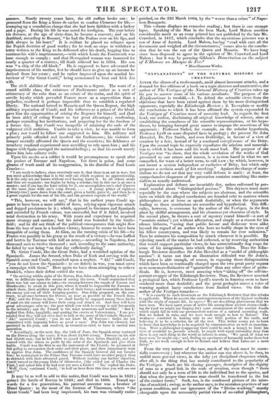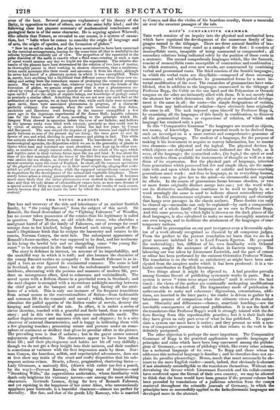"EXPLANATIONS" OF THE NATURAL HISTORY OF CREATION.
AFTER the silence of a twelvemonth, amid almost incessant attacks, and a demand for five editions of a book on a topic abstruse and unattractive, the author of The Vestiges of the Natural History of Creation takes up his pen to answer some of his various assailants. The purpose of the Explanations is twofold,-1. To defend the scientific views from the objections that have been raised against them by his more distinguished opponents, especially the Edinburgh ; 2. To explain or modify the conclusions to which it has been affirmed the system expounded in the 'Vestiges of Creation must of necessity lead. As regards the first head, our author, disclaiming all original knowledge of science, aims at establishing the soundness of his scientific representations, or his hypo- theses, by bringing forward great names to impugn the assertions of his opponents : Professor Nichol, for example, on the nebular hypothesis, Professor Lyell on some disputed facts in geology; the present Sir John Herschel, Dr. Pye Smith, and even Doddridge, in favour of a view of creation by a law, instead of by a continual interference of the Deity. Upon the second topic he expressly repudiates the atheism and material- ism to which it has been said his work must lead. The purpose of the Vestiges was "to show, that the whole revelation of the works of God presented to our senses and reason, is a system based in what we are compelled, for want of a better term, to call Law; by which, however, is not meant a system independent or exclusive of Deity, but which only proposes a certain wade of his working." Against the charge of mate- rialism we do not see that any very valid defence is made : at least, the comprehensive eloquence of the peroration contains something like mate- rialism as usually understood. Explanation and defence are invariably dry, unless enlivened by per- sonal scandal about "distinguished persons. This dryness must more especially be the case where the subjects are abstruse, and the scientific% facts on which the alleged conclusions are founded refer to matters where philosophers are at issue or speak doubtfully, or when the arguments leading to those conclusions are recondite and hypothetical. This diffi- culty, however, is overcome by the author of the Vestiges, in the first place by skilfularrangement, and his clearness yet closeness of style. In the second place, he throws a sort of mystery round himself—a sort of "nominis umbra"; yet without affectation, and simply as a reason for his silence hitherto, "seeing that public favour and disfavour were alike beyond the regard of an author who bore no bodily shape in the eyes of his fellow countrymen, and was likely to remain for ever unknown." Then he animates his composition by attack whenever it is possible. By rejecting much of the matter lie had collected, or by reserving authorities that would support particular views, lie has unintentionally dug traps for some of his antagonists, into which they have fallen. Thus the Edin- burgh Reviewer describes Sir John Herschel as a "model of philosophic caution": it turns out that an illustration ridiculed was Sir John's. The author is able enough, of course, in exposing those disingenuitiea which have been so continually charged upon the two great party organs as to seem more distinctive of "quarterlies" than any other class of perio- dicals. He is, however, most amusing when " taking off" the self-im- portant swagger of the Edinburgh Reviewer. Thus, the Reviewer asserted a geological fact, which Professor Lyell's travels in America seem to have rendered more than doubtful; and the great geologist utters a voice of warning against hasty conclusions from limited views. On this the author of the Vestiges remarks- " It is exactly to such theorizers as the Edinburgh Reviewer that this rebuke is applicable. When he asserts the contemporaneousness of the highest mollusks with the origin of organic life, he says—' We are describing phmnomena that we have seen. We have spent years of active life among these ancient strata—look- ing for (and we might say longing for) some arrangement of the ancient fossils which night fall in with our preconceived notions of a natural ascending scale. But we looked in vain; and we were weak enough to bow to Nature.' The weakness consisted in looking only in one little portion of the earth, and believing it to be a criterion for all the rest. This writer seems yet to have to learn that knowledge is to be acquired by communication as well as examina- tion. Were a philosopher (supposing there could be such a being) to limit his view of mankind to juvenile schools, he might with equal rationality deny that there is any such thing in the world as infants in arms. 'We speak of what we have seen,' he night say; and, finding no specimens of humanity under three feet high, we are weak enough to bow to Nature and believe that babes are a mere fancy.'" From the very nature of the case, much of the book must be essen- tially controversy ; but wherever the author can rise above it, he does, ter unfold more general views, in the lofty yet disciplined eloquence which, after all, is the thing that has mainly contributed to the popularity of the Vestiges. Such are his closing passages, descriptive of the dignity of man as a grand link in the scale of creation' even though " there should not only be a term of life to the individual but to the species, and that when the proper time comes man should be transferred to the list of the extinct forms." Such, too, is the condensed picture of the mise- ries of mankind ; owing, as the author says, to the mistaken practices of our present condition, and our ignorance of the "Divine working," mostly chargeable upon the necessarily partial views of so-called philosophers, even of the best. Several passages explanatory of his theory of the Deity, in opposition to that of others, are of the same lofty kind ; and the following clear but piquant summary of mathematical conclusions and geological facts is of the same character. He is arguing against Whewell ; who admits that Nature, as revealed to our senses, is a system of causa- tion, but " halts when he comes to consider the origin of language and of arts, the origin of species, and the formation of globes."
" Now let us call to mind a few of the laws ascertained to have been concerned in the cosmical arrangements, leaving for the mean time all that is doubtful in the nebular hypothesis entirely out of view. The proportion of the equatorial to the polar diameter of the earth is exactly what a fluid mass rotating at such a rate of speed would assume any day we might try the experiment. The relative dis- tances of the planets have been determined by the relation of two laws of matter, so thoroughly patent in their working to modern observation, that a mathema- tician could ascertain this their result and announce it from his closet, although he never bad heard of a planetary system in which it was exemplified. There is, surely, here anything but a likelihood that different causes from those now ex- isting and acting were the immediate means of producing the cosmical meats. May we not rather say, that, whatever may have been the detailasrroafpge. formation of globes, we possess ample proof that it was a phenomenon en- volved by virtue of exactly the same system of order which we see still operating upon earth ? As to the origin of organic beings, our knowledge of geology comes to precisely a similar effect- Admitting that we see not now any such fact as the production of new species, we at least know that, while such facts were occurring upon earth, there were sysnelated phenomena in progress, of a character perfectly ordinary. For example, when the earth received its first fishes, sandstone and limestone were forming in the manner exemplified a few years ago in the ingenious experiments of Sir James Hall; basaltic columns rose for the future wonder of man, according to the principle which Dr. Gregory Watt showed in operation gefore the eyes of our fathers; and hollows iu the igneous rocks were filled with crystals, precisely as they could now be by virtue of electric action, as shown within the last few years by Crosse and Becquerel. The seas obeyed the impulse of gentle breezes and rippled their sandy bottoms as seas of the present daygood l are doing; the trees grew as now by favour of sun and wind, thriving in seasons and pining in bad. This while the animals above fishes were yet to created. The movements of the sea, the meteorological agencies, the disposition which we see in the generality of plants to thrive when heat and moisture are most abundant, were kept up in silent sere- nity, as matters of simply natural order, throughout the whole of the ages which saw reptiles enter in their various forms upon the sea and land. It was about the time of the first mammals that the forest of the Dirt Bed was sinking in natural ruin amidst the sea sludge, as forests of the Plantagenets have been doing for several centuries upon the coast of England. In short, all the common operations of the physical world were going on in their usual simplicity, obeying that order which we still see governing them, while the supposed extraordinary causes were in requisition for the development of the animal and vegetable kingdoms. There surely hence arises a strong presumption against any such causes. It becomes much more likely that the latter phmnomena were evolved in the manner of law also; and that we only dream of extraordinary causes here, as men once dreamt of a special action of Deity in every change of wind and the results of each season, merely because they did not know the laws by which the events in question were evolved."



























 Previous page
Previous page